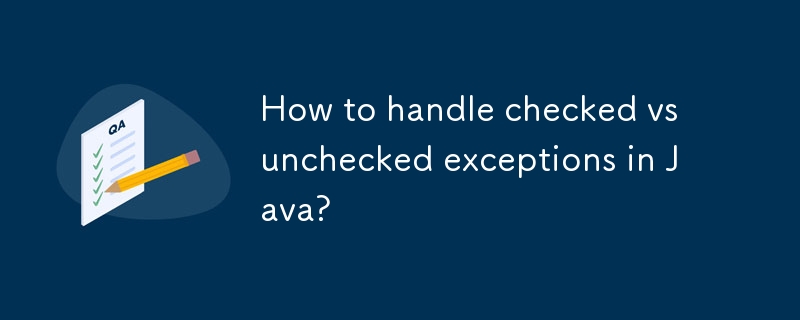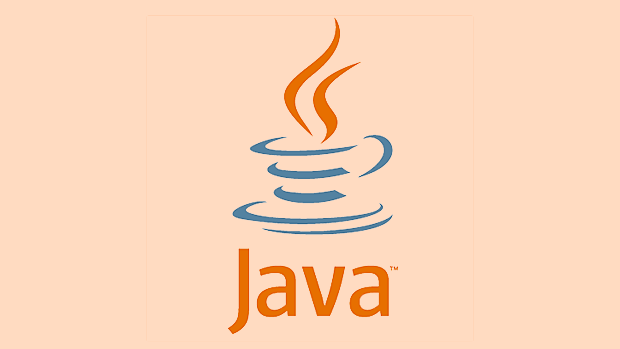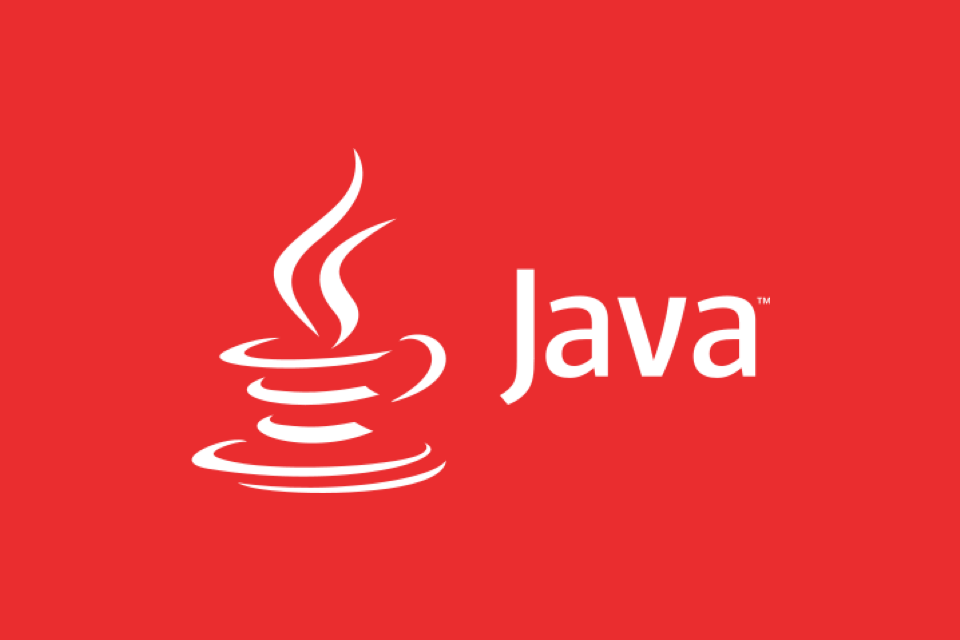How to handle checked vs unchecked exceptions in Java?
Aug 02, 2025 am 12:59 AMChecked exceptions must be either caught or declared in the method signature, as they are checked at compile time and represent recoverable conditions like IOException. 2. Unchecked exceptions, which extend RuntimeException, are not checked at compile time and indicate programming bugs such as NullPointerException, and should be prevented through input validation and defensive coding rather than caught. 3. Handle checked exceptions only when meaningful recovery is possible; otherwise, propagate them using throws. 4. Avoid catching unchecked exceptions unless necessary for logging or graceful shutdown, and instead fix the underlying code to prevent them. 5. Use checked exceptions for expected, recoverable errors and unchecked exceptions for programming errors that should be corrected during development. 6. Do not overuse checked exceptions when the caller cannot reasonably recover, favoring unchecked exceptions in such cases. Proper exception handling improves code robustness and maintainability by ensuring errors are addressed appropriately.

In Java, exceptions are divided into two main categories: checked and unchecked exceptions. Understanding how to handle each properly is key to writing robust and maintainable code.

Know the Difference Between Checked and Unchecked Exceptions
Checked exceptions are checked at compile time. These are typically situations that are expected to occur and can be recovered from, like
IOExceptionorSQLException. Java forces you to either catch them or declare them in the method signature usingthrows.-
Unchecked exceptions (also known as runtime exceptions) extend
RuntimeExceptionand are not checked at compile time. Examples includeNullPointerException,ArrayIndexOutOfBoundsException, andIllegalArgumentException. These usually indicate programming bugs and are not required to be caught or declared.
Rule of thumb: Handle or declare checked exceptions. Fix the code to avoid unchecked exceptions.
How to Handle Checked Exceptions
For checked exceptions, you have two options:

-
Catch and handle them when recovery is possible.
try (FileReader fr = new FileReader("file.txt")) { // do something } catch (FileNotFoundException e) { System.err.println("File not found: " e.getMessage()); // maybe log it, use a default file, etc. } catch (IOException e) { System.err.println("IO error: " e.getMessage()); } Propagate them up using
throwsif the current method isn't the right place to handle them.public void readFile() throws IOException { FileReader fr = new FileReader("file.txt"); // let caller handle the exception }
Prefer handling only when you can meaningfully recover. Otherwise, propagate.
How to Deal with Unchecked Exceptions
You generally should not catch unchecked exceptions unless you have a specific reason (like logging or graceful shutdown). Instead:
Prevent them by validating inputs and using defensive programming.
public void printLength(String str) { if (str == null) { throw new IllegalArgumentException("String cannot be null"); } System.out.println(str.length()); }Use assertions or validation libraries (like Apache Commons or Google Guava) to catch issues early.
In rare cases, you might catch a runtime exception at a top level (e.g., in a web filter or main loop) to prevent crashes and log errors.
- Use checked exceptions for recoverable conditions that the caller should anticipate and handle (e.g., file not found, network timeout).
- Use unchecked exceptions for programming errors (e.g., null reference, invalid argument) that should be fixed during development.
When to Use Each Type
A common best practice: Don’t overuse checked exceptions. If the caller can’t reasonably recover, make it unchecked.
Basically, handle checked exceptions explicitly, avoid catching unchecked ones unless necessary, and write code to prevent them in the first place.
The above is the detailed content of How to handle checked vs unchecked exceptions in Java?. For more information, please follow other related articles on the PHP Chinese website!

Hot AI Tools

Undress AI Tool
Undress images for free

Undresser.AI Undress
AI-powered app for creating realistic nude photos

AI Clothes Remover
Online AI tool for removing clothes from photos.

Clothoff.io
AI clothes remover

Video Face Swap
Swap faces in any video effortlessly with our completely free AI face swap tool!

Hot Article

Hot Tools

Notepad++7.3.1
Easy-to-use and free code editor

SublimeText3 Chinese version
Chinese version, very easy to use

Zend Studio 13.0.1
Powerful PHP integrated development environment

Dreamweaver CS6
Visual web development tools

SublimeText3 Mac version
God-level code editing software (SublimeText3)

Hot Topics
 How to handle exceptions in C++ Lambda expressions?
Jun 03, 2024 pm 03:01 PM
How to handle exceptions in C++ Lambda expressions?
Jun 03, 2024 pm 03:01 PM
Exception handling in C++ Lambda expressions does not have its own scope, and exceptions are not caught by default. To catch exceptions, you can use Lambda expression catching syntax, which allows a Lambda expression to capture a variable within its definition scope, allowing exception handling in a try-catch block.
 How does C++ exception handling support custom error handling routines?
Jun 05, 2024 pm 12:13 PM
How does C++ exception handling support custom error handling routines?
Jun 05, 2024 pm 12:13 PM
C++ exception handling allows the creation of custom error handling routines to handle runtime errors by throwing exceptions and catching them using try-catch blocks. 1. Create a custom exception class derived from the exception class and override the what() method; 2. Use the throw keyword to throw an exception; 3. Use the try-catch block to catch exceptions and specify the exception types that can be handled.
 How do you handle exceptions effectively in PHP (try, catch, finally, throw)?
Apr 05, 2025 am 12:03 AM
How do you handle exceptions effectively in PHP (try, catch, finally, throw)?
Apr 05, 2025 am 12:03 AM
In PHP, exception handling is achieved through the try, catch, finally, and throw keywords. 1) The try block surrounds the code that may throw exceptions; 2) The catch block handles exceptions; 3) Finally block ensures that the code is always executed; 4) throw is used to manually throw exceptions. These mechanisms help improve the robustness and maintainability of your code.
 PHP exception handling: understand system behavior through exception tracking
Jun 05, 2024 pm 07:57 PM
PHP exception handling: understand system behavior through exception tracking
Jun 05, 2024 pm 07:57 PM
PHP exception handling: Understanding system behavior through exception tracking Exceptions are the mechanism used by PHP to handle errors, and exceptions are handled by exception handlers. The exception class Exception represents general exceptions, while the Throwable class represents all exceptions. Use the throw keyword to throw exceptions and use try...catch statements to define exception handlers. In practical cases, exception handling is used to capture and handle DivisionByZeroError that may be thrown by the calculate() function to ensure that the application can fail gracefully when an error occurs.
 Exception handling in C++ technology: How to handle exceptions correctly in a multi-threaded environment?
May 09, 2024 pm 12:36 PM
Exception handling in C++ technology: How to handle exceptions correctly in a multi-threaded environment?
May 09, 2024 pm 12:36 PM
In multithreaded C++, exception handling follows the following principles: timeliness, thread safety, and clarity. In practice, you can ensure thread safety of exception handling code by using mutex or atomic variables. Additionally, consider reentrancy, performance, and testing of your exception handling code to ensure it runs safely and efficiently in a multi-threaded environment.
 Exception handling in C++ technology: How to optimize the performance of exception handling?
May 09, 2024 am 10:39 AM
Exception handling in C++ technology: How to optimize the performance of exception handling?
May 09, 2024 am 10:39 AM
In order to optimize exception handling performance in C++, the following four techniques can be implemented: Avoid unnecessary exception throwing. Use lightweight exception classes. Prioritize efficiency and design exception classes that contain only necessary information. Take advantage of compiler options to achieve the best balance of performance and stability.
 How does C++ exception handling enhance code stability by preventing code crashes?
Jun 03, 2024 am 11:36 AM
How does C++ exception handling enhance code stability by preventing code crashes?
Jun 03, 2024 am 11:36 AM
Exception handling is a feature in C++ used to handle errors and exceptions to prevent code crashes. This can be achieved through the following steps: Throw an exception: Use the throw statement to throw an exception object. Catching exceptions: Use try-catch blocks to catch exceptions and specify the type of exceptions that need to be handled in the catch block. Practical application: For example, in the case of a file opening error, you can throw an exception and then use a try-catch block in the calling code to handle the exception. Exception handling provides many benefits, including preventing code crashes, maintaining code stability, simplifying error handling, and enhancing code readability and maintainability.
 PHP exception handling: how to catch and handle runtime errors?
Jun 04, 2024 pm 12:11 PM
PHP exception handling: how to catch and handle runtime errors?
Jun 04, 2024 pm 12:11 PM
Exceptions are objects in PHP that represent errors when a program is running. Exceptions can be caught and handled using try...catch statements: code that may throw an exception is executed within a try block. Use the $e object in the catch block to access the details of the exception, including message, code, and file path.







